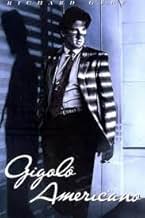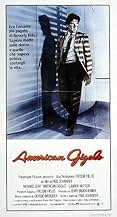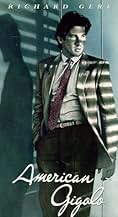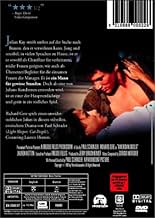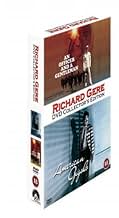AVALIAÇÃO DA IMDb
6,3/10
31 mil
SUA AVALIAÇÃO
Um acompanhante de Los Angeles, que atende principalmente a uma clientela feminina, é acusado de um assassinato que ele não cometeu.Um acompanhante de Los Angeles, que atende principalmente a uma clientela feminina, é acusado de um assassinato que ele não cometeu.Um acompanhante de Los Angeles, que atende principalmente a uma clientela feminina, é acusado de um assassinato que ele não cometeu.
- Prêmios
- 2 indicações no total
Nina van Pallandt
- Anne
- (as Nina Van Pallandt)
Patricia Carr
- Judy Rheiman
- (as Patti Carr)
Macdonald Carey
- Hollywood Actor
- (as MacDonald Carey)
Avaliações em destaque
Giorgio Moroder's signature synths followed by Deborah Harry's instantly recognisable new wave classic, Call Me, opens up American Gigolo as we see a pretty suave 80s Richard Gere in a black Cadilliac driving along the beachside. Gere has all the trappings of a wealthy 80s lifestyle so usually romanticised in a Bruckheimer production but the film establishes in its first few scenes that Gere is pretty much a buck for hire with little sway over his Aryan madam. This form of bait and switch appears throughout the movie, with Gere appearing in control and pretty cool at first and then as a total whore. The dichotomy between these two personas plays a big part of the film's plot as Julian K., Gere, becomes entangled in a murder investigation of a trick who is the wife to a wealthy S&M aficionado and learns that he should question the many friendships he's procured during his career as a loverboy. Lauren Hutton plays a random woman that Gere meets and develops into the film's love interest after one of the most minimalist sex scenes in an 80s film. The set production, music, acting and story is all very connotative of the eighties. Apartments are gray or salmon coloured with minimalist artwork and expensive vases and silver blocky stereo systems - it's clear with some scenes, including one where Gere hangs upside down to do some crunches, that the set design heavily influenced the mise-en-scene of Mary Harron's adaptation of American Psycho. Moroder's various compositions of Blondie's Call Me highlight the continuing descent of Julian k. as the chorus becomes more melancholic and ominous - it's all very suspenseful from an eighties perspective. Some may find the final scenes slightly ridiculous and most likely unrealistic, but one should remember that American Gigolo was produced by Jerry Bruckheimer and even on the tail end of New Hollywood, the film does show caution in its dark themes as not to alienate mainstream audiences. I definitely felt the material was pretty subdued for a film written and directed by Taxi Driver's Paul Schrader. However, it doesn't matter as the film is effective as a time capsule of the seedier side of the eighties.
I was under the impression that "American Gigolo" was one of those "cult" movies I never understood why so many people liked in the first place. But I was utterly surprised by the user rating of this movie and the fact that there are only a couple of comments. But the biggest surprise is I actually liked the movie, I found it extremely interesting and thought it had a great 80's feel to it. Richard Gere, who never really impressed me with anything, is in the role of his lifetime, playing his playboy role to perfection.
Director Paul Schrader made a smart movie that doesn't have to show everything in order for the viewer to know what happens and I liked it. The ending is very suitable and I especially love the last scene and Gere's last sentence which really touched me.
I didn't really understand the plot, but with Gere, a great score that manages to keep a single song interesting throughout the entire movie and great directing "American Gigolo" stands high above average and is one of the best movies of the eighties. 8/10
Director Paul Schrader made a smart movie that doesn't have to show everything in order for the viewer to know what happens and I liked it. The ending is very suitable and I especially love the last scene and Gere's last sentence which really touched me.
I didn't really understand the plot, but with Gere, a great score that manages to keep a single song interesting throughout the entire movie and great directing "American Gigolo" stands high above average and is one of the best movies of the eighties. 8/10
It's important that Paul Schrader put 'American' in his title. This isn't just something to make it a title that is easily recognizable or to know what country it's from. It's about an American state of being, what it is to be a gigolo who likes swanky suits and fast cars and, well, the women he gets what he has to work for. But what happens when this man's reputation is called into question, or what kind of reputation a gigolo has? Politics also comes into it, not too oddly enough, as Julian (Richard Gere) catches the eye of a woman who is married to a Senator. That the movie is technically a murder mystery, sort of, as Julian is accused of killing a woman who he had seen previously as a 'fetish' customer, is almost besides the point. It is good for the plot, but what Julian has to focus on, the big question for him, is what is he doing with himself? How do other people look at him?
He makes himself a sex symbol, of sorts, as he works out religiously and always gets the best clothes (like a peacock perhaps). Schrader puts a lot of focus on the relationship Julian has with Michelle, who genuinely cares about him and is probably the only person he knows who is straight with him (certainly not the pimp played by Bill Duke, or his mentor who has her own gaggle of men and women to 'send out'). Of course sexuality plays into it, but I liked the fact that Schrader didn't focus squarely on it. He's interested in some of the mechanics of it (there's a scene where Julian/Michele do it, but it's shot much in the way of Godard's A Married Woman, lots of single shots of body parts, some flesh, but selective eroticism), and then, mostly, the consequences.
But, again, the look of the film should be an indicator. This is Los Angeles of 1979/1980, but it portends the future decade not just in the city but in the kind of middle-upper (or just upper) class lifestyle of expensive restaurants, good drinks, good clothes, and sometimes good women (or just lonely older women). Schrader even has a way of looking ahead to the future with Giorgio Moroder's score, which takes Blondie's "Call Me" and turns it into a synth score full of dread and mystery and drama. On top of how the look, its stylish exteriors and careful lighting (the Bruckheimer look before Tony Scott took it over with smoke machines), and the depth of the script, Gere is also fantastic here. He was on a roll right after Days of Heaven, and here he lights up the screen with charisma, pathos, intensity, and a sense of where to take the scenes where they need to be.
He, much like the environment around him, makes up what is the backdrop for a tale of morality in high society, hypocrisy where it may lay in the highs and lows, and what it means to fall in love. The only part it doesn't fully work is as a full-fledged thriller (again, the murder-mystery element is the weakest link), but everything else sparks the screen with interest and excitement.
He makes himself a sex symbol, of sorts, as he works out religiously and always gets the best clothes (like a peacock perhaps). Schrader puts a lot of focus on the relationship Julian has with Michelle, who genuinely cares about him and is probably the only person he knows who is straight with him (certainly not the pimp played by Bill Duke, or his mentor who has her own gaggle of men and women to 'send out'). Of course sexuality plays into it, but I liked the fact that Schrader didn't focus squarely on it. He's interested in some of the mechanics of it (there's a scene where Julian/Michele do it, but it's shot much in the way of Godard's A Married Woman, lots of single shots of body parts, some flesh, but selective eroticism), and then, mostly, the consequences.
But, again, the look of the film should be an indicator. This is Los Angeles of 1979/1980, but it portends the future decade not just in the city but in the kind of middle-upper (or just upper) class lifestyle of expensive restaurants, good drinks, good clothes, and sometimes good women (or just lonely older women). Schrader even has a way of looking ahead to the future with Giorgio Moroder's score, which takes Blondie's "Call Me" and turns it into a synth score full of dread and mystery and drama. On top of how the look, its stylish exteriors and careful lighting (the Bruckheimer look before Tony Scott took it over with smoke machines), and the depth of the script, Gere is also fantastic here. He was on a roll right after Days of Heaven, and here he lights up the screen with charisma, pathos, intensity, and a sense of where to take the scenes where they need to be.
He, much like the environment around him, makes up what is the backdrop for a tale of morality in high society, hypocrisy where it may lay in the highs and lows, and what it means to fall in love. The only part it doesn't fully work is as a full-fledged thriller (again, the murder-mystery element is the weakest link), but everything else sparks the screen with interest and excitement.
Okay-ish thriller-drama. Plot setup was good but it just seems to drift from a point. Ending is a bit trite and quite predictable. Surprising, as the movie is written-directed by Paul Schrader, who wrote Taxi Driver and Raging Bull for Martin Scorsese. Maybe he shouldn't direct... (though Affliction was great and Cat People was decent).
Performances are OK. This was Richard Gere's breakthrough role.
Performances are OK. This was Richard Gere's breakthrough role.
"American Gigolo" really is slick and stylish. As slick and stylish as any film could be, so you really wonder whether this is Schrader's film or Jerry Bruckheimer's? If you look solely at the screenplay, it almost fits into the typical Schrader exploration of any given 'seedy underworld'. You could even argue that Julian and Michelle are in a way similar to Travis and Betty. Looking at the final product, however, I see a slick Hollywood mystery-thriller that's actually far more interesting for its romantic sub-plot than for any of the suspense parts.
Don't get me wrong, in places "American Gigolo" is a quality character study, and the romance is as well-written as you could ever expect from a major, mainstream Hollywood production, but the suspense thriller portion is just so banal, expected, and predictable that it really takes away from an otherwise very good film. Perhaps most worthy of praise here is Richard Gere who gives one of his best performances here, and I certainly cannot even begin to imagine John Travolta in the lead role.
It sounds like I'm criticizing how stylish this film is, I'm really not. It's pulled off pretty darn well in comparison to how many films of this sort have ended up, and you have to admit Gere's wardrobe is impressive. The film is well-shot and well-acted and for the most part quite well-written (although this is far, far from Paul Schrader's best work as a screenwriter). My comments on the film's slickness are really just a natural reaction to this film coming right after "Hardcore". Indeed, it seems like this film is a signpost for the early 80's (the dud of a score proves it) where in Hollywood even homicide cases with a Gigolo as the main suspect are glamorous rather than gritty.
A lot of people hate this film, but it has also gained a large cult following and a respectable following from film critics and aficionados, even landing a spot on the 'They Shoot Pictures, Don't They?' top 1000 list, and I can't really understand why anyone would have such extreme feelings about a film that is just watchable and entertaining. I don't think Schrader did his best work here, but it's not his worst either and the film as a whole is so unimposing and forgettable that I find it hard to believe it has so many fans and so many detractors.
7/10
Don't get me wrong, in places "American Gigolo" is a quality character study, and the romance is as well-written as you could ever expect from a major, mainstream Hollywood production, but the suspense thriller portion is just so banal, expected, and predictable that it really takes away from an otherwise very good film. Perhaps most worthy of praise here is Richard Gere who gives one of his best performances here, and I certainly cannot even begin to imagine John Travolta in the lead role.
It sounds like I'm criticizing how stylish this film is, I'm really not. It's pulled off pretty darn well in comparison to how many films of this sort have ended up, and you have to admit Gere's wardrobe is impressive. The film is well-shot and well-acted and for the most part quite well-written (although this is far, far from Paul Schrader's best work as a screenwriter). My comments on the film's slickness are really just a natural reaction to this film coming right after "Hardcore". Indeed, it seems like this film is a signpost for the early 80's (the dud of a score proves it) where in Hollywood even homicide cases with a Gigolo as the main suspect are glamorous rather than gritty.
A lot of people hate this film, but it has also gained a large cult following and a respectable following from film critics and aficionados, even landing a spot on the 'They Shoot Pictures, Don't They?' top 1000 list, and I can't really understand why anyone would have such extreme feelings about a film that is just watchable and entertaining. I don't think Schrader did his best work here, but it's not his worst either and the film as a whole is so unimposing and forgettable that I find it hard to believe it has so many fans and so many detractors.
7/10
Você sabia?
- CuriosidadesDebbie Harry has said the film's main title song "Call Me" was inspired by driving and she visualized the film's opening sequence when writing it. She said: "When I was writing it, I pictured the opening scene [of the movie], driving on the coast of California." Harry was first given an instrumental rough track titled "Man Machine" by Giorgio Moroder and was asked to write the melody and lyrics for the song. Reportedly, this only took her a few hours to do.
- Erros de gravaçãoHelicopter carrying the camera is clearly reflected just above the right rear wheel of the Mercedes.
- Citações
Julian Kaye: Why me? Why did you pick me?
Leon: Because you were framable. You've stepped on too many toes. Nobody ever cared about you. I never even liked you much myself.
- Versões alternativasABC edited 21 minutes from this film for its 1983 network television premiere.
- Trilhas sonorasThe Love I Saw in You Is Just a Mirage
by Smokey Robinson (as W. Robinson) and Marvin Tarplin (as M. Tarplin)
Performed by Smokey Robinson & The Miracles (as Smokey Robinson and The Miracles)
Courtesy of Motown Records
Principais escolhas
Faça login para avaliar e ver a lista de recomendações personalizadas
Detalhes
- Data de lançamento
- País de origem
- Central de atendimento oficial
- Idiomas
- Também conhecido como
- Gigoló americano
- Locações de filme
- Sunset Plaza Apartments - 1220 Sunset Plaza Drive, Mt. Olympus, Hollywood Hills, Los Angeles, Califórnia, EUA(Westwood Apartment Hotel, demolished 1987 and replaced by a totally different building - see GE at the actual address)
- Empresas de produção
- Consulte mais créditos da empresa na IMDbPro
Bilheteria
- Orçamento
- US$ 4.800.000 (estimativa)
- Faturamento bruto nos EUA e Canadá
- US$ 22.743.674
- Fim de semana de estreia nos EUA e Canadá
- US$ 3.559.930
- 3 de fev. de 1980
- Faturamento bruto mundial
- US$ 22.745.134
Contribua para esta página
Sugerir uma alteração ou adicionar conteúdo ausente


